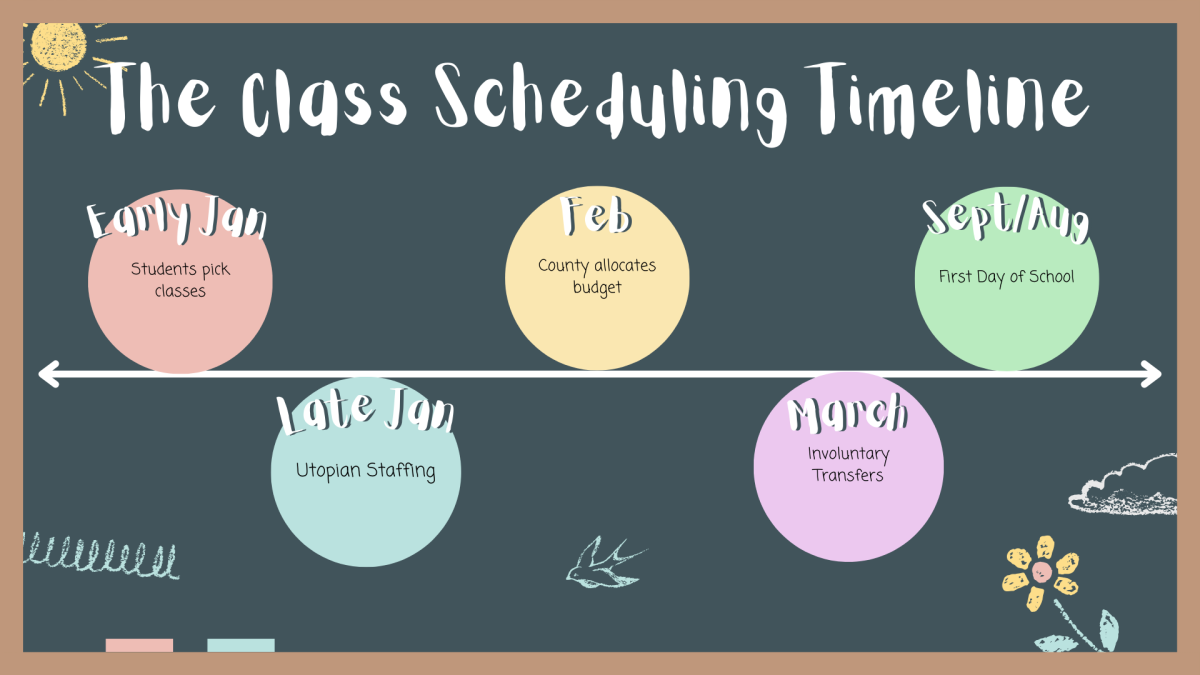Montgomery County has always had an excellent school system; in Newsweek’s 2010 “America’s Best High Schools: The List,” seven schools from Montgomery County were included, including WJ.
Students are encouraged to succeed to their full capacities and capabilities. However, an ever-increasing, detrimental effect of such pressure is apparent among many students not only at WJ but throughout MCPS. With the mounting challenge to take higher math classes at younger and younger ages, without first learning the rudiments of basic math, students are pushed further than they are ready for.
In an interview with the Washington Post, Frieda Lacey, Deputy Superintendent of MCPS said, “Some students were placed in classes, and perhaps they weren’t as prepared as they should have been.”
The Montgomery County Board of Education (BOE) has finally admitted that they made a mistake. In a statement revealing the errors of math education, the Board stated that elementary and middle school students will no longer be encouraged to take math classes above their abilities. Students will be offered higher classes on an individual basis; however, the majority will spend extra time on fundamental math concepts that will prepare them for high levels in the future.
The report admitted that too many students were pushed into accelerated classes and the county has resolved to delve into simpler concepts on deeper levels.
“I have been teaching for 25 years and when I saw the second grade math standards come down to kindergarten ten years ago, I knew we were on the wrong track,” said WJ mother and National Board Certified Teacher Dara Feldman. “We were missing the boat in laying a strong foundation. Having students really grasp concepts through developmentally appropriate practices were thrown out the window in hopes of gaining a competitive edge.”
Students feel the mounting pressure and take higher-level math classes in order to succeed in the future, taking accelerated math courses without first gaining a strong knowledge in the fundamentals of even Algebra 1. They are in classes two, even three years ahead of their grade levels, and are expected to retain a multitude of facts that may be above their critical thinking and problem solving development.
Senior Eva Shpak is a prime example gifted students falling behind due to premature acceleration.
“Students don’t really know what they are getting themselves into when they are in seventh or eighth grade and deciding on a math course to take that will determine their math classes through the rest of high school,” she said. “But when it comes down to taking calculus as a junior and those basics you learned in middle school have already been crammed out of your memory, you wish you hadn’t been pushed to taking such a high course so early.”
Shpak’s mother had similar concerns as she watched her daughter struggling in accelerated math classes.
“Tilden Middle School pushed kids to take accelerated math classes. By eleventh grade, the only choice Eva had was Calculus, AP or with applications, or AP Stat,” said Zina Shpak. “She chose to take Calculus with applications assuming that that would the class with a slower pace than the AP class. What a nightmare that was.”
Students may not begin experiencing difficulties until later on, if ever; however, when an honors student experiences immense difficulties in a class deemed “appropriate,” then it can be assumed that something is wrong with the education system.
Many students are entering into higher-level math classes without having a clear understanding of the foundations of math, and students who are not necessarily “math people” find themselves lost in classes beyond their capabilities.
At WJ, some students enter classes such as Calculus without an in-depth foundation in algebra. Concepts that should not be a problem can become difficult and students may find themselves unprepared.
“It happens all the time,” said WJ math teacher Erin O’Connell. “I find, however, that it’s not that they don’t grasp Calculus—it’s the composition.”
Students make simple algebra mistakes in math classes due to a lack of comprehension of prerequisite details. O’Connell is pleased that the county has finally taken a look at the detrimental effects of acceleration, as the problems with math education are steadily growing.
In terms of the accelerated curriculum, Feldman feels strongly.
“I truly believe it backfired,” said Feldman. “I feel it took away a lot of the joy, meaning and authentic purpose for learning mathematics. We rushed through topics without going deep enough for mastery.”
Accelerated programs begin in kindergarten and do not cease until graduation. It is important to place gifted students in higher classes that meet their abilities; however, acceleration should be met on an individual basis.
“Suddenly, the honor student with mostly A’s and some B’s would bring home C’s and D’s,” said Zina Shpak. “We had multiple meetings with the school administration and the teacher. We hired a tutor. Nothing seemed to work. Kids are pushed to take higher-level classes – but it seems to me that high school is not prepared for that.”
Frequently, students have to resort to math tutoring outside of school when math education has become too overwhelming. Excellent math education is not just relevant for future math and engineering majors, but is important for all students, as math teaches analytical and abstract thinking.
“Last year’s math experience did not go well, and teachers should take some responsibility, as well as the accelerated math department,” said Zina Shpak. “Students should always have choices that Eva did not have last year.”
According to the new county math curriculum plan, students will spend more time preparing for courses such as Algebra 1 and Geometry, so that they can acquire a solid foundation of the subject’s basics before pursuing higher levels.
While the county is committed to assessing the current math curriculum, changes will begin in elementary and middle schools, and it will take a few years before high schools see the results. High school math teachers are not always to blame for the discrepancies, when curricula demand more than students are prepared for.
“At this point, exposure to as much as possible is great,” said O’Connell. “It is our job to fill in the gaps.”
MCPS is making efforts to revise its standardized curriculum to ensure that students are prepared to understand basic math. However, for most, they’ll believe it when they see it.







MCPS Mom • Dec 21, 2010 at 6:12 am
When the students are handed calculators in early grades and taught graphing on a calculator rather than understanding how the graph is created, they have lost the fundamental number skills they need to progress in mathematics. Waiting until Algebra to correct the problem is still too late. Another example of the famous “every student in MCPS is gifted and talented” gone wrong. It’s a shame that all of our students currently in high school have fallen prey to this. Kudos to Taliah for an excellent article. It should be mandatory reading for every parent of elementary school kids.